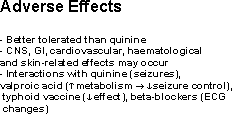|
Mefloquine
|
Malaria
- a killer returns
- Incidence
of malaria on the rise due to resistance of mosquito (the vector)
to insecticides and of Plasmodium (the parasite) to antimalarial drugs�
- Sharp increase in deaths from malaria
|
Antimalarial
Therapy
- Chloroquine
is the mainstay of therapy�
- Quinine is old yet effective�
- Other antimalarials are amodiaquine, proguanil, pyrimethamine, mepacrine
- Primaquine for falciparum malaria�
- Mefloquine, artemisinin, artemether, artesunate are newer agents�
- Sulfonamides, trimethoprim, tetracyclines and quinolone have some
antimalarial activity
|
Limitations
of Existing Antimalarial Therapy
- Resistance
to chloroquine is common�
- Plasmodium falciparum infections are particularly a threat because
of severity of infection and drug resistance�
- Adverse effects with quinine�
- Other agents are not as effective as first line therapy
|
Mefloquine
- Acts
against malarial parasite at erythrocytic phase�
- Schizonticidal�
- Effective against P. falciparum and P. vivax
- Effective even in chloroquine and quinine resistant cases
|
Pharmacokinetics
Absorption
-
Well absorbed from GI tract�
- Peak concentrations in 6 hours
Distribution�
- Widely distributed
Elimination�
- Half life : 21 days�
- Drug persists in the body�
- Mefloquine and metabolite mainly excreted in bile anf faeces
|
Dosage
Single
dose 1000 mg or 15 mg/kg body wt.
In multidrug
resistant cases 25 mg/kg�in 2 divided doses
Administer
with a 250 ml water (vomiting following administration reduces the
drug availability in the body)
For
prophylaxis�
250 mg or 5 mg/kg once weekly 1-2 weeks before entering a malarial
area and continuing for 4 months after leaving
|

|
Contraindications
- Pregnancy
- 1st trimester�
- Children < 3 months age or < 5 kg weight
|
Indications
- Chloroquine
and multi drug resistant Plasmodium falciparum or vivax infection�
- Prophylaxis in endemic areas
|
Salient Features
- Used in
treatment of chloroquine resistant and multi drug resistant malaria
due to P.falciparum or P.vivax�
- Near 100% success rates�
- A drug of choice in cerebral malaria�
- Convenient single dose administration�
- Long half life, hence persistence of drug in the body, preventing
recrudescence�
- May be used alone or with other antimalarial drugs, if necessary�
- May be used for prophylaxis
|
|

